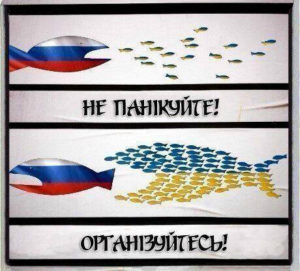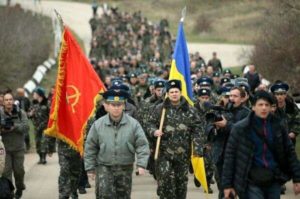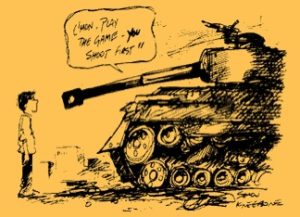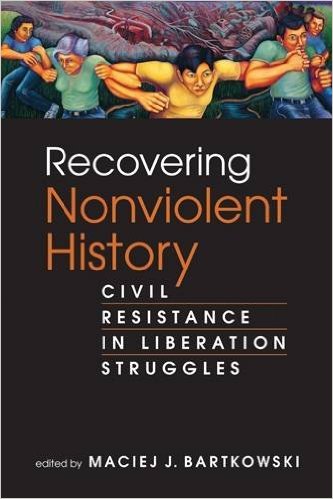During the last 17 days – from the date of the Russian military aggression in Crimea (Feb.27) to the referendum on the peninsula (Mar. 16) Ukrainians have launched one of the most impressive civil resistance campaigns in the history of unarmed struggles with foreign military invasions and occupation. The richness and creativity of the actions that Ukrainians undertook matched their strategic value as well as a realistic assessment of the military strengths of the Ukrainian army vis-à-vis its Russian counterpart. There is also a strategy of not responding to provocations and maintaining a remarkable posture of restraint even in the midst of escalating confrontation – all in order to not give the Russian regime what it wants: a bloody pretext that could be used to justify a deeper military incursion of the Russian army into Ukrainian territory.
The strategic Ukrainian resistance consists of at least five types of actions:
– Building-up economic pressure on Russian companies
– Reaching out to the Russian civil society
– Unarmed defense pursued by the Ukrainian army
– Fostering unity among Ukrainian society in the face of a foreign invasion and relentless Russian propaganda
– Reforms of the state assisted by the mobilized Ukrainian society
The overall strategy of the unarmed engagement is based on the realistic (given the Russian military superiority), and often beautiful, nonviolent actions carried out by hundreds of thousands of Ukrainian citizens all over the country. In the last 17 days, these actions, among others, included:
Boycott
- There is a growing boycott of products made in Russia or imported from Russia into Ukraine. It is spearheaded by the same group of activists that led the boycott campaign against the financial and economic assets owned by the members of the Party of Region. Their Facebook page now has close to 60,000 members and they use their activist skills honed during the anti-Yanukovych campaign to lead the boycott campaign against Russia. One of the activists acknowledged that the boycott of Russian goods is much easier than the economic boycott of the Party of Regions – there is no need to convince people to do it and no one is worried about being fired. The activists-bloggers issued the call to boycott the Russian products and distributed the list of the Russian companies and goods, together with the Russian products’ bar code 046, on the Ukrainian market. In Lviv, 7,000 “boycott flyers”‘ with the list of Russian products were distributed in front of the French supermarkets, Auchan. The flyers and activists warned that buying the Russian-made goods meant giving financial support to the occupant. The German supermarket chain, Billa in Ukraine, coincidentally began placing small national flags, including the Russian one, next to the price tags of the products on the shelves. Activists say this helps customers to quickly identify the countries where particular goods are from in order to help the boycott. Flashmobs of “dead bodies” appear in the supermarkets to dramatize the need for the boycott of Russian goods so as not to “pay for the occupation and war.” Some grocery stores are already reportedly offering discounts on the boycotted products, and there are still no customers willing to buy them. Protesters on some roads in Ukraine encouraged drivers to boycott Russia’s second largest oil company, Lukoil and to stop using their gas stations. The passing drivers gave support to the picketing activists by pressing their car’s horns and flashing their car’s lights.
Reaching out to the Russian people and their rulers
- An open letter from the Russian speaking Ukrainians and ethnic Russians living in Ukraine was sent to President Putin rejecting his military intervention and stating that their interests do not need to be protected by another state. More than 142,000 people have signed, and the number is still rising. Ordinary Russian-speaking individuals in Ukraine issued their own public pleas to the Russian government and President Putin to withdraw Russian troops from Ukraine and respect their country’s territorial integrity. Russian citizens in Ukraine said in the videopost that they do not need to be rescued by Russia. Ukrainian Jews (a majority of whom are Russian speakers) issued an open letter to Putin in which they say that they “do not wish to be defended” by the Russian state and strongly oppose “sundering Ukraine and annexing its territory.”
- Open letters were written and signed by Ukrainians of various professions, addressed to their Russian counterparts. The letter of Ukrainian cinematographers to their Russian colleagues with the call for solidarity stipulated the latter’s public response to state their opposition to the Russian military intervention in Ukraine. Famous Russian rock singers called for peace and friendship between Russians and Ukrainians. Well-known Ukrainian actors and writers posted their video appeals to Russians.
- Ukrainian scholars and academic institutions issued a public appeal to their colleagues in Russia after the Russian parliament approved the military invasion of Ukraine. They expressed their deep concerns about the propaganda that sows disinformation about the situation in Ukraine and particularly the Russian speakers in Ukraine while emphasizing cultural and historical ties between the Ukrainian and Russian people. They emphasized that there was no conflict over the language or culture. The language of science and education is the language of peace and cooperation. And they called on their Russian counterparts to influence the Russian government and to do all they can to prevent war between the two brotherly nations. In response, the representatives of the Russian academic and education community expressed their solidarity with their Ukrainian colleagues and offered their support to the Ukrainian people in their efforts to achieve “freedom, democracy and social justice.” They also called on all Russian scientists, scholars, students and teachers to sign the solidarity letter.
- Ukrainian artists and intellectuals publicly appealed to Russian artists and people of culture who expressed their support for Putin and his military intervention in Ukraine. The appeal countered Putin’s propaganda about the violent Maidan, discrimination against the Russian speakers in Ukraine and legitimacy of the referendum in Crimea. The appeal ended with the comment that those who support the occupation lose the moral right to ever walk on Ukrainian soil.
- Ukrainian retired and serving soldiers are reaching out to Russian army officers with the appeal to not support military intervention in Ukraine. A Ukrainian writer sent an open letter to his colleague and former classmate from the military college who is now general in the Russian intelligence directorate and asked him to influence the decisions of his bosses so the blood of “your and our children will not be spilled.” In the last part of the letter he offers his classmate the examples of heroic actions by other soldiers who saved civilian population in past conflicts even though they knew they would face the consequences for their disobedience.
- Ukrainian models from the city of Ternopil made a video appeal to Russian soldiers. In the silent appeal, the models brought signs that called on the soldiers to go home where their own girlfriends, fiancées and wives wait for them.
- Odessa residents called Putin to let him know that they are doing just fine as Russian speakers in Ukraine and do not need special protection from the Russian government.
- Ukrainian children made an anti-war public appeal to Russian President Putin.
- Ukrainians have reached out to their family members, friends and colleagues in Russia to explain the Russian regime’s manipulation of information about Ukraine and the situation of the Russian-speaking population that is neither discriminated against nor asking to be rescued by any external military intervention.
Nonviolent restraint of the Ukrainian army
- Nonviolent defense is the official defense strategy of the Ukrainian government as far as its soldiers stationed in Crimea are concerned. According to Oleksandr Turchynov, the speaker of the Ukrainian parliament, the Ukrainian army in Crimea defends its military bases, equipment, and its ships without arms in order to not fall for provocations.
- Marches of unarmed Ukrainian soldiers challenged the Russian army blockade of their military bases. On March 4, more than 100 Ukrainian soldiers marched without arms toward the Russian military units that blocked the Belbek military airfield near Sevastopol. The warning shots flew over their heads while they pressed on. They forced negotiations with the Russians and won domestic and international sympathy and admiration. Other Ukrainian army units physically blocked the Russian army from capturing warehouses with weapons. Meanwhile, the wives of other Ukrainian officers protected their husbands and reduced hostilities by creating a human shield between their husbands and the Russian soldiers. Local populations, including Tatars, bring food provisions for the Ukrainian soldiers that are blocked inside their military bases by the Russian soldiers.
- A Ukrainian army unit in Kerchi (in Crimea) organized an anti-war music concert. The Russian soldiers stationed nearby heard the concert. They said they liked the music. Fraternization “from a distance” between Russian and Ukrainian soldiers can also take on a more humorous quality like the encounter between a Ukrainian captain and a Russian vice-admiral. A Russian ship ordered the Ukrainian military frigate “Ternopil” to surrender. The response of the Ukrainian captain was, “Russians do not capitulate.” When asked to explain, the captain said that he is ethnically Russian, but swore allegiance to defend the Ukrainian people and Ukraine, and he cannot break that oath. The Russian vice-admiral was reported to have said to his soldiers, “Learn [from this captain] how to serve with honor and dignity.”
The nonviolent restraint that the Ukrainian army and society have shown in the face of the armed invasion of Crimea, and the citizens’ campaign to reach out to their Russian counterparts and the general population have all paid off. Though the Russian population’s support for Putin remains very high — close to 70 percent – Russian society is not a monolith, and Ukrainians can seek potential allies there and rely on their support.
- On March 15 50,ooo Russians organized the March of Peace to protest Putin’s intervention in Ukraine, called for Ukraine’s unity and expressed solidarity with the Ukrainian people, chanting in Ukrainian “Glory to Ukraine! Glory to Heroes!” in Ukrainian.
- A famous Russian actress, in obvious civil disobedience against her own regime declared, in public that she would not betray Ukraine.
- Solidarity signs could also be found on billboards in Moscow. The Russian flight company, S7, placed between its Kyiv- Moscow destination the peace sign with the plane inside instead of standard lines.
- On March 9, the Russian activists in St. Petersburg came to the main entrance of the headquarters of the Russian Navy and placed the sign “Sailors! The enemy is in Kremlin, not in Ukraine!”
Civilians in Crimea loyal to Ukraine
- Protests of 15,000 women and children all over Crimea were organized against Russian military intervention during a holiday that is popular in both Ukraine and Russia – the March 8 ‘International Women’s Day’ (see the videos). The protesters created a human chain in protest against the Russian military intervention on the peninsula. At the same time on Maidan in Kyiv, women held a solidarity rally and wrote postcards with words of support for the Crimean women.
- In a Crimean town, local residents demanded that the Russian soldiers leave and insisted that they do not need their protection.
- Despite intimidation Crimean intellectuals – ethnic Russians, Ukrainians and Tatars – released a video where they rejected the Russian propaganda about the existence of conflict between Russians, Tatars and Ukrainians, and called for a united Ukraine and expressed their opposition against the artificial separation of Crimea from Ukraine.
Referendum in Crimea- March 16
- Activists organized a symbolic funeral of the freedom of speech in Crimea on the eve of the referendum.
- On March 13, activists organized a flash mob in Simferopol to protest the referendum with tapes across their mouths – a telling symbol of how the authorities tried to silence people to ensure the victory of the pro-Russian camp.
- Some Crimeans, including the head of the Bahchisaraysky region, called for boycott of the referendum. The referendum in Crimea was eventually boycotted by the Tatar population and pro-Ukraine electorate. Some who went to the polling station protested by deliberately casting spoiled ballot papers.
- While the referendum in Crimea was taking place, a pro-Ukrainian protest in Dnipropetrovsk, on the east was organized in support of the Ukrainian people’s unity against the referendum.
National unity campaigns
- On February 26, to protest the manipulation of the language issue by politicians in Kyiv and in solidarity with Russian-speakers, Lviv appealed to its residents to speak Russian at home, in public spaces and work places. In response, the activists from Donetsk and Odessa – the Russian speaking regions – called for using Ukrainian on that day. Lviv-based publishing house “Old Lion” announced it would begin printing books in Russian – a first since its establishment 11 years ago- to “show respect for the Russian speaking citizens of Ukraine who defend the independence of Ukraine.” Eventually, the acting president vetoed the controversial language legislation passed by Verkhovna Rada.
- At the beginning of March, the city councils of Odessa, Kharkiv, Kherson, Mykolaiv, Dnipropetrovsk condemned the Russian aggression. Solidarity and unity demonstrations were joined by several thousands of residents in Donetsk (10,000 protesters), and in Kharkiv and Odessa (20,000 protesters). These took place on March 2, March 4 and March 5 respectively. People sang patriotic songs and called for territorial integrity of Ukraine. Thirty one rectors of the universities in Kharkiv (the city traditionally close to Russia) publicly criticized the Russian military intervention. On March 9, 3000 Odessans crowded the famous Potemkin stairs in Odessa Port to support the territorial integrity of Ukraine and sang the Ukrainian national anthem
- During the ceremony of the official closing of the Paralympic Games in Sochi, Russia on March 16 attended by President Putin the only Ukrainian representative, Ludmilya Pavlenko – (despite opposition from the organizers) – insisted on wearing ribbons with the Ukrainian national colors in her head wreath and the sign of peace (in Russian and English) on her shirt when she entered the stadium to bid farewell to the spectators.
Protests against the Russian military invasion
- Thirty Odessan activists hung spaghetti on the front fence of the Russian consulate in the city to “thank” the Russian government for the anti-Ukrainian propaganda and to protest the lies. Spaghetti on the fence illustrated the Russian proverb of hanging noodles on someone’s ear to show they have been lying. Automaidan – active during the revolution against Yanukovych – organized auto-actions in Odessa on March 8, in front of the Russian consulate to protest the Russian military invasion.
Mobilized Ukrainian society pressures the new government to deliver while it also confers legitimacy on it
- Activists and the police serve in joint patrols throughout the city to maintain the security on the streets. Activists also maintain the Maidan barricades and pressure the politicians to move Ukraine closer to the EU and to begin implementing needed socio-economic reforms. Automonitor – that emerged from Automaidan – picketed Verkhovna Rada to force her to deliver on her promises of effective work.
- The Maidan civic groups (Euromaidan Public Sector and “New Citizen”) launched the “Intensive Reforms Package” initiative that brings together 120 experts and activists to work on the blueprint for reforms.
- Maidan activist, Yegor Sobolev, heads the newly established Lustration Committee.
Check the article on nonviolent victory of the Ukrainian Maidan that includes examples of nonviolent actions that Ukrainians used to fight the Yanukovych regime.







Recent Comments